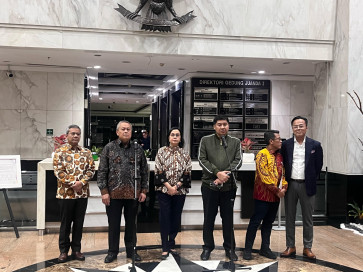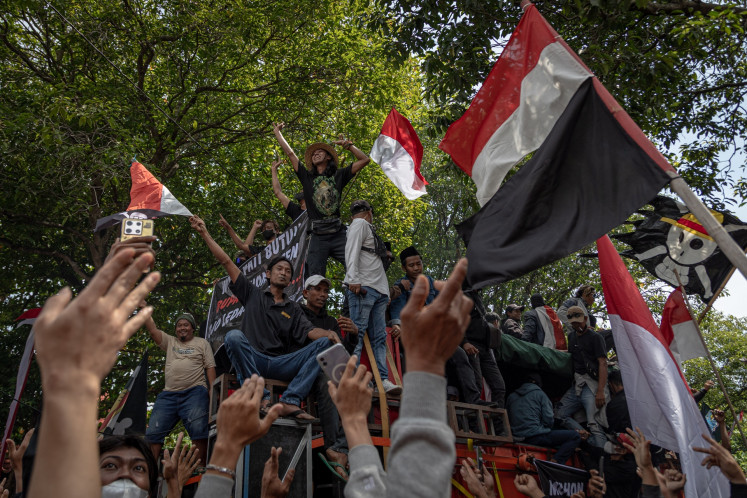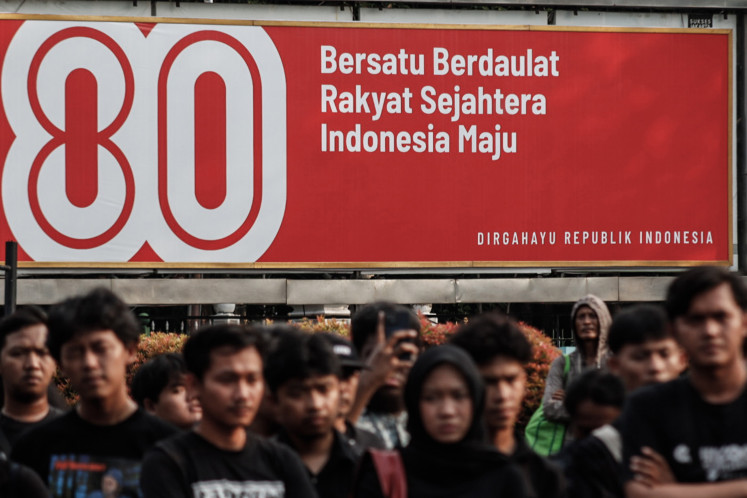Popular Reads
Top Results
Can't find what you're looking for?
View all search resultsPopular Reads
Top Results
Can't find what you're looking for?
View all search resultsEditorial: Ali Sadikin, the marine
Ali Sadikin, the man who fearlessly criticized Soeharto for 28 years, the man who will be remembered by future generations as the father of Jakarta's development, has left the nation
Change text size
Gift Premium Articles
to Anyone
Ali Sadikin, the man who fearlessly criticized Soeharto for 28 years, the man who will be remembered by future generations as the father of Jakarta's development, has left the nation.
The man who deserved the highest honor of a state funeral for his extraordinary services to his country chose to be buried in Tanah Kusir and not in the National Heroes Cemetery, both in South Jakarta.
Many Indonesian youths probably know him simply as a former Jakarta governor. He was a reformist long before students, activists and politicians talked about reformasi. It is our misfortune to be blessed with so few role models such as Ali.
Born on July 7, 1927, he was a Cabinet minister under Sukarno and a governor under Soeharto. It is true we tend to say good things about a person only after they have died. But Ali has long deserved our respect and praise.
When he died Tuesday, many people had forgotten that for 28 years, Ali Sadikin, a retired three-star marine general, was one of Soeharto's staunchest critics until the latter's fall on May 21, 1998. He was an icon for our democracy. Almost every Tuesday throughout Soeharto's dictatorship, and with no fear, Ali Sadikin gathered with his colleagues in the Petisi 50 group of government critics to outspokenly censure Soeharto.
At the time the national media was too frightened to print his remarks, and the group became an easy target of bullying by government officials and military generals. Only the foreign media were interested in their activities.
Bang Ali, as he was affectionately known during his tenure as governor of Jakarta from 1966 to 1977, was among a select few Indonesians highly respected both as a high-ranking official and as a government critic. Ali was not like many others who suddenly turned into democratic and anti-government activists after losing lucrative government positions.
We wish to express our deepest condolences to his children and wife. Ali Sadikin is a true role model for us. He was, of course, subject to the shortcomings and controversies that form a part of our human frailties, and we cannot say that as governor of Jakarta he committed no wrongdoings.
With all due respect to those who contributed so much and even risked their lives during the height of nationwide protests to end Soeharto's rule in 1998, we need to remember this man and his small group put their own lives at risk from a much earlier time. Petisi 50, comprising people of various backgrounds, almost every week roundly reproved Soeharto when most Indonesians were too scared to make their own views heard.
Some members of Petisi 50 (50 signifying the number of people who signed a declaration criticizing Soeharto's statements and policies) were jailed under Soeharto's rule, such as Lt. Gen. (ret) H.R. Dharsono, H.M. Sanusi and A.M. Fatwa. Soeharto ensured all members of the group suffered financially and politically.
The plainspoken Ali Sadikin was a true development legend and a trustworthy democratic fighter. He died on the day the nation commemorated the centennial anniversary of National Awakening Day. Indonesia owes him much for his role as the voice of our conscience when Soeharto held near absolute power. Only Ali and a few others were willing to take the risk of angering Soeharto with their cutting criticism at a time when Soeharto considered himself above the law.
As Jakarta governor, Ali Sadikin bequeathed us a rich legacy of urban development which we continue to enjoy 31 years after he ended his 11-year term. He bravely defied the objections of Muslim leaders to legalize gambling and prostitution, and then challenged these opponents not to make use of the roads and mosques he built with the gambling taxes.
"I built 2,400 schools, more than 1,200 kilometers of road, improved kampongs, health centers, mosques and regreening programs with the city's money. Some of the money came from gambling... I hate gambling, but illegal gambling existed and I needed money," he wrote in his book Pers Bertanya Bang Ali Menjawab (The press asks and Bang Ali answers).
Many people now have good things to say about Soeharto. But we need to remember the nation needs more leaders like Ali Sadikin, who was successful as a government official but consistent in giving voice to the people's conscience. Rest in peace, Bang Ali.










